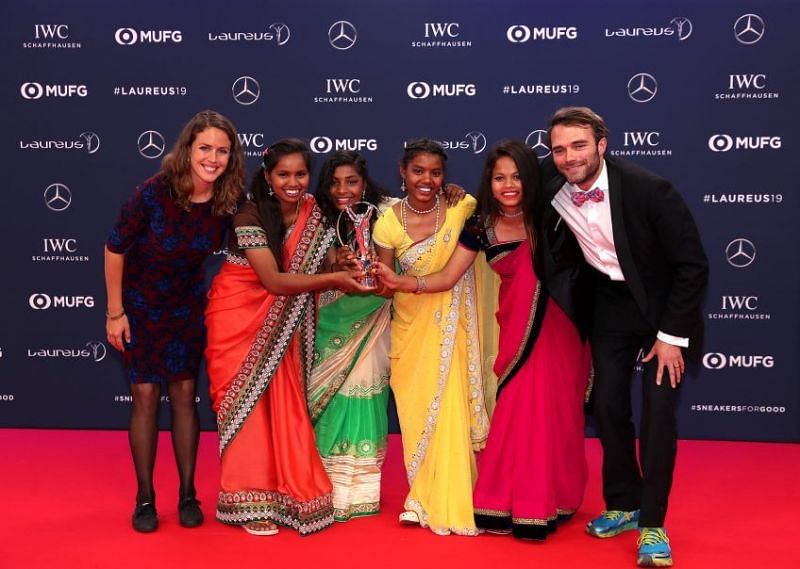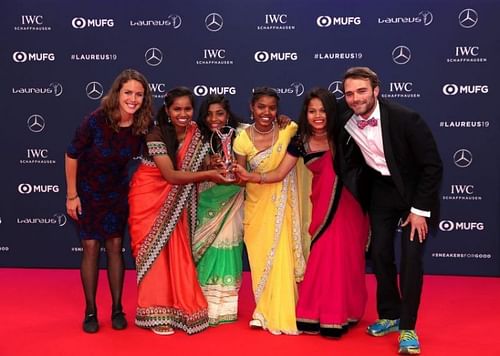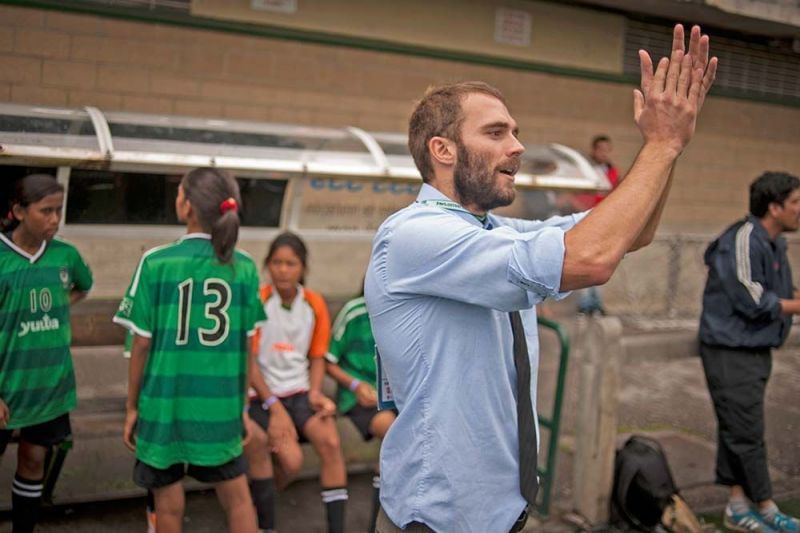
Empowering young girls through football: In conversation with Yuwa co-founder Franz Gastler

Franz Gastler is an American social entrepreneur who came to India and began his journey working for sports and development. His journey is unique and teaches one great lesson about how sports can be a force for change.
Gastler is a co-founder of a non-profit organisation called Yuwa-India, which is supported by several Olympians. The organisation aims to use football as a tool to empower the girls in the rural areas of Jharkhand.
Here's a Q/A to learn more about Gastler and his work.
1. Can you please introduce yourself?
FG: First, I'd like to introduce and congratulate our first graduating class from Yuwa School! All 9 of our 2020 graduates have been admitted to prestigious universities in India, the United States, Spain and Costa Rica. These include Ashoka University, Krea University, Mondragon (Spain), Earth University (Costa Rica) and numerous American universities including The New School, Ithaca University, St. Michael's, Whittier and Guilford and others.
All of them are the first in their families to pursue higher education and the first in their communities to be admitted to prestigious universities.
I started Yuwa in 2009 with three of my high school friends from Minnesota (USA). Originally, Yuwa was a scholarship foundation for hard-working students from a government school to attend a private English medium school. My other co-founders and I pooled our money together for the scholarships.
At the same time, some girls from the school where I was volunteering as an English teacher asked if I would coach a football team. Despite the fact that I was not a football player, I said yes. I had many years of experience coaching kids downhill skiing in my hometown- Edina, Minnesota. At first, I tried to start the football program for girls and boys—but the boys were inconsistent in their attendance and wouldn’t commit to coming to practices. The girls, however, showed outstanding work ethic and dedication.
This was the first time a program had been specially designed for girls. In villages, girls are expected to spend all of their time in the service of their families—not going to school, not studying, and certainly not having fun or playing sports.
More and more girls joined the Yuwa team. The program started to gain momentum when an after-school English class was offered for the football girls. At this point, Yuwa was led by me, and I was training three local boys as football coaches, a local woman who primarily worked with the girls’ mothers, and volunteers who came in to teach English and Math classes.
Through the positive peer pressure created by daily team practices, the girls started going to school every day, taking an interest in their own education and simply taking care of themselves. Before joining, they were shy, quiet girls who mumbled responses with their eyes on the ground. After months of daily practice and affirmation in a positive social network, they became confident, bold football players who weren’t afraid to introduce themselves to strangers.
After a year, it was obvious that football had the potential to be an effective platform to organise and empower young women. Ironically, the girls who were originally selected for the Yuwa scholarship to a private school were doing very poorly— they were still missing 40 – 50 days of school each year. The girls on the scholarships would only drop by Yuwa once a month to collect their school fees. In contrast, the girls playing football would come by to study every single day. The girls receiving the scholarships lacked the positive social support that was being provided by the Yuwa girls’ football teams.
2. When and how did you begin your journey in sports?
FG: I'm from Minnesota, the United States' capital for ice hockey and home to the biggest alpine skiing community east of the Rockies -- I think more winter Olympians come from Minnesota than any other state. I grew up playing these sports and teaching skiing for 12 winters. I was also practising judo as well.
3. Why did you choose to come to India after pursuing a business career in the US for some time?
FG: I did my BA and Masters from the University Professors program at Boston University and completed the Program on Negotiation at Harvard Law School. I was driven by a curiosity to understand the real dynamics at the so-called “Bottom of the Pyramid”. Supported by Sam Pitroda, I first came to India to work with CII on corporate CSR models in Gurgaon. After a year, I left CII to get a more real on-the-ground experience and landed in an NGO in Jharkhand. Then, I departed from the NGO to do something more meaningful and impactful – living in a village and starting youth programs.
4. What were some early lessons and challenges that you faced in launching and running Yuwa? Can you tell us more about the organisation?
FG: Yuwa has faced many challenges over the years: resistance from parents, jealousy and hostility from people in the village, abuse from government officials and AIFF coaches, difficulty acquiring proper playing grounds, to name a few. The girls themselves, however, are the ones who face the most challenges. These are best understood in the girls’ own words.
Here are a couple of TEDx talks delivered by Yuwa players:
In rural Jharkhand, 6 in 10 girls drop out of school and become child brides. Jharkhand has the lowest ratio of teachers per government school in India and is among the worst for female literacy. The state ranks among the worst for human trafficking and in sanitation- key issues which create challenges for empowering girls and women.
Yuwa’s programs aim to put girls’ futures back in their own hands—to rewrite the script that society has assigned them. Yuwa does more than simply delay marriage until the age of eighteen—we are enabling girls to break out of the cycle of poverty and make powerful decisions about their futures. Our intensive, holistic programs provide girls with the tools and skills they need to reach their full academic potential, develop critical and creative thinking skills as well as become compassionate, empowered leaders in their communities.
Successful programs empowering girls and women in Jharkhand can be used as models for almost any other state in India.
5. How did you grow the non-profit into the brand that it is today? Also, can you talk about the partnership with Laureus and some Olympic athletes amongst others?
FG: Endurance is the most important ingredient, and I believe refusing to focus on growth at the expense of quality and child safeguarding. We've kept our focus on the least valued in society: underprivileged girls.
Laureus chose Yuwa from, I think, 140 organisations it works with worldwide because of the quality, safety and impact of our programs. This year, five-time Olympic Gold Medallist Missy Franklin is working with us to help promote the stories of the girls of Yuwa and hopefully drive some awareness and support. In the past, we've gotten a lot of moral support from incredible Indian sportsmen, including Shiva Keshavan and Abhilash Tomy.
6. What have you learnt from your work with the girls, and what can you say about the impact of sports on development?
FG: It’s not easy. Even after a decade, the girls in Yuwa are still fighting all the same fights they always have -- they've just become better fighters.
Yuwa cannot “save” every girl who comes through our programs. After a certain point, the girls need to have enough strength and determination to stand up for themselves. If a girl is not willing to resist the pressure put upon her to get married early or drop out of school, then there is very little anyone can do to help her—no matter how many hours Yuwa staff spend in her home consulting her parents.
Yuwa works to build strong, positive teams that act as a second family for girls, to give them the support and encouragement necessary to take control of their lives despite the extreme pressure put upon them to give in.
7. Yuwa School also started a few years ago. What can you tell us about this venture?

FG: Rose Thomson co-founded the Yuwa School along with me in April 2015. Rose first came to India on a post-graduate fellowship, studying the use of sports to help girls. After joining Yuwa in 2012, Rose managed the education programs for three years before deciding to start a full-time girls school.
Yuwa School was launched so that girls can truly achieve their dreams and ambitions. Yuwa’s before and after school tuition classes were simply not enough to ensure that the girls could pursue quality higher education. Rose launched Yuwa School with 45 students and six full-time teachers.
The goal of Yuwa school is to enable each student to reach their full academic potential, develop critical and creative thinking skills and become compassionate, empowered leaders in their communities. Currently, we have 104 students in standards 3 – 12. We want to prepare graduates to go on to top universities in India and abroad. Seven of our ten 12th class students have been admitted to universities in the United States already.
The Yuwa School is an innovative and excellent, low-cost English medium school for girls from ST, SC and OBC backgrounds. The Yuwa School’s atmosphere is one of collaboration, respect and mutual learning. The vision of our school is: every girl’s future in her own hands.
For a Yuwa girl to change her future, the first step is to believe in herself. Yuwa works to create a community where girls are encouraged and supported to be ambitious leaders. At the Yuwa School, it is important for each teacher to re-enforce these core beliefs for students:
Yuwa School teachers come from all across India and sometimes from different countries as well. Students follow the NIOS (National Institute of Open Schooling) curriculum but teachers are strongly encouraged to use supplementary material in the classroom.
Yuwa’s library has hundreds of books donated from across India and the US, including many novels and story-books for readers of all levels. Daily lesson plans are diverse and include varied activities such as group projects, presentations, individual research, partner work, debates, competitions, and experiments. Classes are not lectures from the teachers as the students are actively involved in everything, constantly being challenged to think critically.
8. What are your personal future goals? Where do you see Yuwa going from here?
FG: Our major goal is to build a permanent campus on 3 acres of land Yuwa has purchased in Khunti, near Ranchi. Till now, we've been working out of rented buildings with no security about where we'll be working from year-to-year.
Our goal for Yuwa is to continue to provide a safe, inspiring environment through team sports that give girls a sense of confidence, camaraderie and community, and to provide girls with the tools to take their futures into their own hands by providing an exceptional academic experience at Yuwa School. We're looking for partners to continue to help us grow!